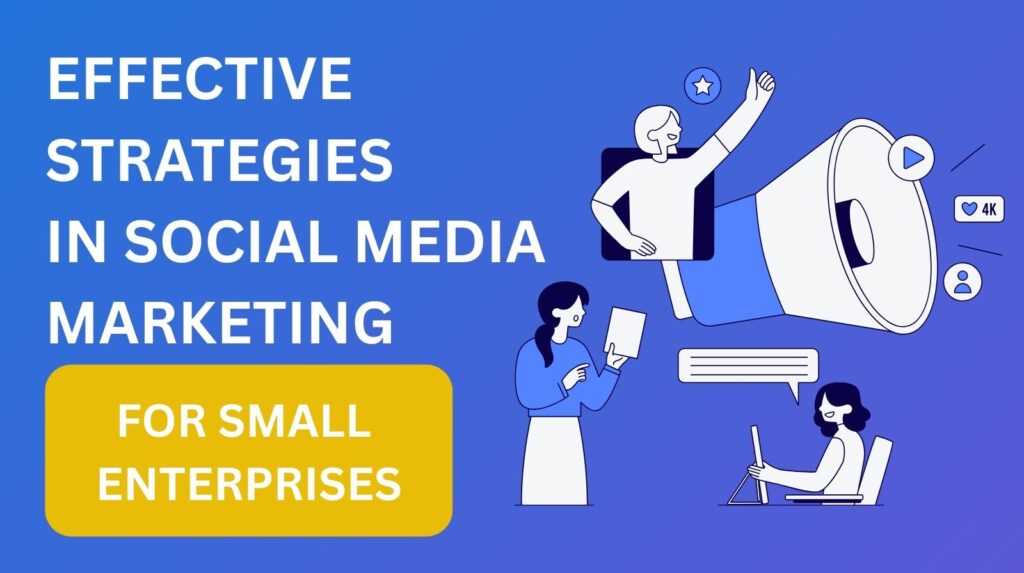Effective Strategies in Social Media Marketing for Small Enterprises
For small enterprises, social media serves as an effective tool for accessing and converting an audience. In comparison to conventional marketing, social media marketing cuts down on costs and expenses, while promoting an enterprise and capturing the attention of potential customers. In this text, the goal is to describe an effective social media strategy for small enterprises, while also optimizing for search engines within the year 2025.
The Importance of Social Media Marketing
For small enterprises, marketing on social media channels is not optional. Businesses can communicate with customers on platforms such as Facebook, Instagram, LinkedIn, and TikTok. Social media also offers valuable information about customers, such as buying preferences. By implementing the right strategy, small businesses will increase brand presence and visibility, positively influence their SEO, and drive conversions.
-
Establishing Your Intended Audience.
Before developing your content, you have to understand who your customers will be. What are their demographics, interests, and major issues? Facebook Audience Insights and Instagram Analytics are great sources of this information. In addition, knowing the audience improves your message, platform choice, and engagement level. Social media marketing efforts often fail without audience comprehension.
-
Establish Goal and KPI Parameters
Measurable outcomes are essential to any social media marketing strategy. Your objectives can be to increase brand awareness, improve website traffic, or increase sales. Don’t forget to include KPIs like engagement rate, click-through rate, and follower growth. Small businesses are able to track their growth and strategy adjustments by setting goals. This helps to improve ROI.
-
Identify Your Core Social Media Platform
Not every business can operate on any social media. LinkedIn is suited for B2B marketing, while Facebook and Instagram are for B2C. TikTok and YouTube are video content heavy, Twitter is best for short snippets of content, and news. Your business should focus on social media where your target market is to avoid inefficient resource allocation.
-
Make Quality Content
Social media marketing is ultimately designed to promote content. Quality content includes captivating and informative images, videos, infographics, and written content. Using SEO keywords in captions and hashtags and descriptions helps improve visibility. By consistently posting content, you cultivate their presence, trust, and followership.
-
Embrace Video Marketing
In 2025, moving pictures will continue to be appreciated in social media. From short videos to tutorials, behind-the-scenes snippets to live streams, video content will drive engagement, surpassing that of still content. Small businesses should make the most of Instagram Reels, TikTok, and YouTube Shorts. On your videos add and share to your website as videos will improve SEO and keep users on your site for longer.
-
Audience Interaction
The true heart of social media is the engagement of its users through conversations. Regular responses to comments, messages and mentions will keep conversations flowing. Ignite discourse by proposing questions, and conducting surveys and polls to keep your users engaged. By responsive to community focused engagement, small businesses will improve loyalty and social visibility.
-
Paid Advertising
The use of paid social media will be the quickest way to target the audience small businesses need. Facebook and Instagram Ads will allow businesses to precisely target and reach users. Paid social media will also allow businesses to operate on small budgets and still achieve great results by optimizing ads to target clicks, engagement, or conversions.8. Leverage Influencer Marketing
Working with influencers can help increase your brand reach. For small businesses, micro-influencers are especially budget-friendly and usually provide better engagement. Moreover, influencers provide value in establishing brand trust and credibility with their followers. With the right influencers, those who align with your brand, you can diversify your reach, increase social proof, and strengthen your brand’s SEO.
-
Optimize Social Media Profiles
Optimized social media profiles improves discoverability. For social media profiles, an elaborate business description, ISI keywords, a website link, and correct contact details are vital. Professional profiles and cover images that align with your brand and a consistent brand design across platforms increase your brand strength. Consistent design improves recognition and strengthens your brand marketing efforts.
-
Schedule Content Consistently
Consistency in social media marketing is key. Consistent social media activity retains audience attention and improves algorithm activity. Content scheduling tools, such as Hootsuite, Buffer, and Later, and content calendars help provide a variety of balanced, timely, and scheduled posts which improves audience retention and engagement rates.
-
Analyse Competitor Strategies
For small businesses, analysing competitor strategies is key to understanding market trends and discovering gaps in service offerings. Monitor competitor content and assess their posting frequency, engagement rates, and advertising strategies. You should also assess the performance of their keywords and hashtags. Competitor insights should allow for better-defined strategies, leading to improved social media marketing.
-
Use Hashtags and Keywords
Hashtags and keywords enhance content visibility and discoverability. Employ a mix of trending, niche, and branded hashtags to expand your reach. In addition, using ISI keywords in captions, posts, and descriptions will enhance your content’s SEO and increase the chances of your content showing up in search results. Hashtags optimize your posts to ensure they are seen by people interested in what you offer.
-
Contests and Giveaways
User-generated content, sharing, and engagement are of the most important metrics in social media advertising. Contests and giveaways are an effective way to enhance social engagement and advertising. They should increase your follower count and are easy to promote as they can be shared. Make sure the rules are clear, and prizes are worthwhile.
-
Employing Analytics to Assess Performance
It is essential to use platform analytics to gauge Engagement Rate, Followers Growth, Clicks, and Conversions. In addition, you may use Google Analytics to measure social traffic to your website. By analysing performance over time, social media directed toward small businesses is able to identify What Works, Pivot, and Realign Integrate social media to Business Goals.
-
Emphasize Local SEO Integration
For small businesses, local SEO is invaluable. Use location-based keywords and hashtags on your posts to reach customers in your vicinity. Moreover, claiming and optimizing your Google My Business listing will help your business. For businesses looking to increase foot traffic, local social media marketing is essential.
-
Promote User-Generated Content
Encouraging customers to share photos, reviews, and testimonials featuring your products builds trust and authenticity. Social profiles and websites should incorporate UGC as it boosts engagement. Enhanced trust is gained along with social proof and positive SEO signals.
-
Collaborate with Other Small Businesses
Working with other small businesses that fit well with yours can help you reach new customers. Joint marketing campaigns, sponsored events, and cross-promotional activities can help you reach new prospects. Moreover, such partnerships provide valuable backlinks, new content, and additional marketing avenues, thus positively impacting SEO and marketing goals.
-
Keep Up with Trends
Social media is one of the fastest-changing environments and being aware of the latest platforms and viral content is vital. Keeping up with industry news, monitoring competitors, and testing new tools can help. Moreover, adopting trends increases audience engagement and enhances brand perception. Such activities will help improve your overall digital marketing efforts and help you become more responsive.
-
Automate Repetitive Tasks
Time management and the provision of automation tools is an important consideration. Platforms like Hootsuite, Buffer, or Later offer versatile automation features, including post scheduling, mention tracking, and report generation. This automation will give you more time to devote to other creative tasks, while your social media continues to function seamlessly.
19. Maintain Brand Consistency
Having identical messaging and visuals reinforces your brand. Be sure that your logo, banners, and content style are the same across different platforms and that these elements communicate your core values. Such balanced and integrated design will help garner trust and recognition and will support other social media efforts by making your business memorable.
Conclusion
For small businesses, social media marketing provides valuable opportunities for connection, traffic, and sales. Following the steps of targeted content creation, engagement, paid social campaigns, influencer partnerships, and SEO will help small businesses see real growth in 2025.
Finally, trend-cantered, audience-focused, and adaptable strategies will provide the best results. With the right combination of creativity, consistency, and analytics, social media strategies will optimize SEO and enhance overall business performance.

